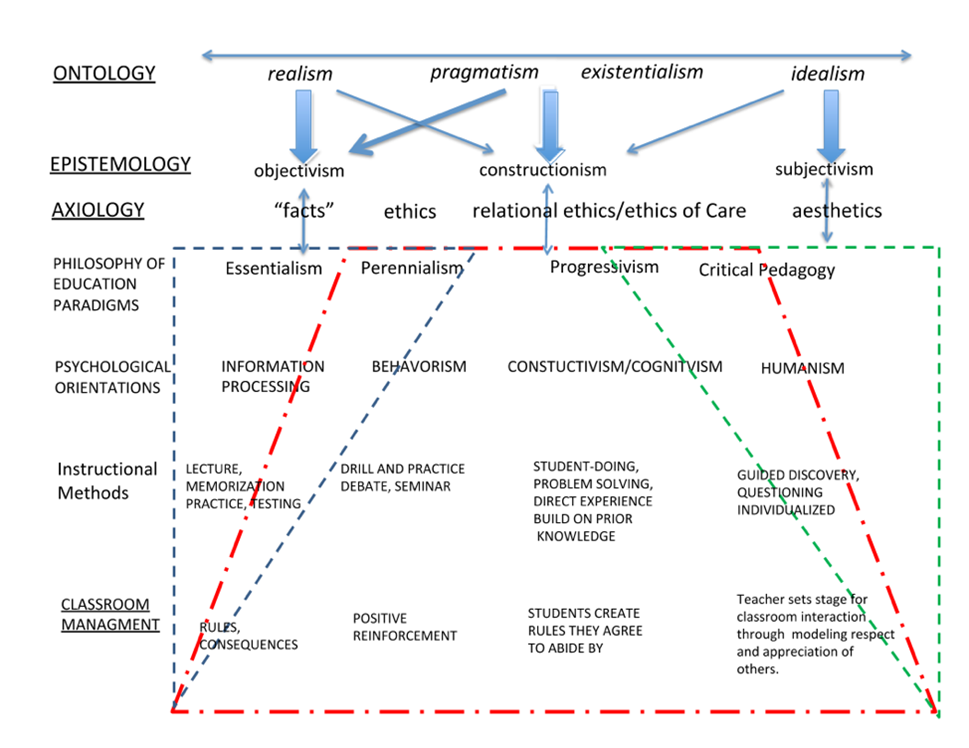EDUC 393 Cross-curricular Reflexive Writing #2
In my first cross-curricular reflexive writing assignment, I focused on educational paradigms and their ability to shift and keep pace in our changing world. I drew upon Sir Ken Robinson and his argument that it comes down to the “structures and habits of our institutions and the habitats they occupy” (2010). I spoke of the challenges facing teachers in these institutions and habitats; of how difficult it is for them to keep up with the rapidly changing structures and habits within them. What I did not address, as pointed out in your feedback, is how I see myself, and my emerging teaching philosophy, connecting to the foundational philosophies of our profession:
A philosophy grounds or guides practice in the study of existence and knowledge, while developing an ontology (the study of being) on what it means for something or someone to be—or exist. Educational philosophy, then, provides a foundation which constructs and guides the ways knowing is generated and passed on to others. Therefore, it is of critical import that teachers begin to develop a clear understanding of philosophical traditions and how the philosophical underpinnings inform their educational philosophies; because a clear educational philosophy will help guide and develop cohesive reasons for how each teacher designs classroom spaces and learning interactions with both teachers and students (SUNY Oneonta Education Department).
An important consideration that directly correlates to my effectiveness as a teacher within our professional institutions and habitats—in the classroom, school, and broader school community.
My first paper lacked personal agency. I got wrapped up with the systems and forgot that my personal agency is critical. What I do and who I am in educational institutions and habitats is important and within my control. I cannot control the systems, or the shifting educational paradigm, but I can control how I function in them. Thank you for the reminder and for challenging me to think about what it means to me, as a teacher candidate, with an emerging teaching philosophy. Parker Palmer (1997) asserts:
[I]f we want to develop the identity and integrity that good teaching requires, we must do something alien to academic culture: we must talk to each other about our inner lives, risky stuff in a profession that fears the personal and seeks safety in the technical, the distant, the abstract (p. 20).
Palmer’s push to embrace teaching from the heart has advanced our profession and led to improved teacher performance. Teachers in the profession are more comfortable embracing their inner selves, merging the inner with the outer self, and speaking to colleagues as people, not just as teachers—something I feel comfortable doing, with you, my professor and mentor.
I grew up privileged, in a traditional, ‘blue-collar,’ middle class home—one full of love, opportunity, and guidance, but also rules, discipline and high expectations. My parents married young (sixteen and seventeen) and recently celebrated their forty-second wedding anniversary. They did not graduate from high-school, but they worked hard and did well for themselves. At fifteen years of age, my dad went to work at Dunkley Lumber; he worked his way up to a prominent position and retired at the age of sixty, after forty-five years of committed service. My mom was a ‘stay-at-home mom’ and put everything into raising my brother and I: taking us to school and sports, making healthy meals, and ensuring the house ran smoothly and efficiently.
I was afforded the chance to participate and compete in figure skating, volleyball, basketball, and baseball. Sports instilled me with dedication and grit, as well as a competitive spirit and an appreciation for team and comradery. I started my first part-time job at twelve years of age, working in a busy salon assisting 12 stylists. I walked from school to the salon three days a week, working until nine in the evening, as well as Saturdays and summer holidays. At sixteen years of age, I started working summer holidays at Dunkley Lumber, resuming my salon schedule during the school year. Sports and work were important aspects of my life, but education was imperative. My parents recognized the worth of education in our changing world, knowing the opportunities they had were no longer available without higher education.
I was urged to put great effort into my studies and my hard work was met with positive reinforcement and recognition. I received Principal’s Roll throughout elementary and high-school, graduated valedictorian of my class, and won scholarships to a number of universities, including the University of Northern British Columbia where I attended and received further yearly scholarships and the distinguished Golden Key award. I was dedicated and did very well, but I recognize my privileged circumstances. Nothing had impeded my learning: I had extremely supportive parents who instilled me with the successful learner traits of compassion, creativity, enthusiasm, confidence, risk-taking, strategy, industriousness, and thoughtfulness (Successful Learners); my home was safe, secure, and nurturing; I had a community of friends, family, and coaches; and my educators were “masters” in the field of education.
My path began to shift after my third year of university. I married and did not to return for my fourth year. My husband was from a traditional European family and it was implied that I should be home with him, not attending university in a different city. I began working at Dunkley Lumber, where I functioned in administration for seven years before the birth of my three children. After I became a mother, I was fortunate to stay home and raise my children just as I had been raised. Then, when my sons were five and my daughter two, life was turned upside down—an old growth fir tree fell and crushed the cab of my husband’s truck, leaving him in the hospital with a severe frontal lobe brain injury. His personality and our relationship changed dramatically. We divorced but I was fortunate to have the support of my parents and the instilled traits they, and my upbringing, had afforded me. I returned to UNBC, finished my Bachelor of Arts Degree, and was recognized as the Most Outstanding Geography Student.
After graduation, I immediately started working as an uncertified teacher teaching on call (TTOC) within School District #28. Once in the classroom, it did not take me long to see the correlation between what life had dealt me (the good and the bad) and my emerging teaching philosophy—one based on structure, guidance, ethics, expectations, dedication, and opportunity, as well as the 5 C’s: commitment, care, courage, consciousness, and centeredness (Litz, 2021).
Had you asked me what my teaching philosophy was six weeks ago, I would have told you that it was ‘a little old school.’ But I have been enlightened—by you, other professors, and the scholarly knowledge provided—to a point where I can elaborate on my ‘old school’ ways. Table 1: Philosophies of Education Matrix (below), and the Visual Literacy Activity that accompanied it, from Chapter 5.1: Foundations of Educational Philosophy (SUNY Oneonta Education Department), helped me discern my emerging teaching philosophy:

Table 1: Philosophies of Education Matrix
First, the Visual Literacy Activity had me choose one instructional activity from Table 1 that I felt was an effective means of instruction and explain why. I chose ‘student doing, problem solving, direct experience, build on prior knowledge’ because only by doing can a student better understand concepts and content; only through problem solving and direct experience can students gain familiarity with subject matter/material and understand their own ways of learning; and only prior knowledge can serve as the base upon which students build on their learning.
Second, the activity directed me to choose a classroom management technique from Table 1 that I felt was effective and explain why. I identified ‘positive reinforcement’ because students are more likely to respond positively when given positive feedback; it is a necessary component of engagement and facilitates positive relationships between teachers and student and between student and school expectations/rules/boundaries. In Every Kid Needs a Champion (2013), Rita Pierson, educator with forty years of experience, argues that “kids don’t learn from people they don’t like”; that learning only occurs when there is a positive relationship between student and teacher; that relationships must be built upon positive, not negative, reinforcement—that is: “say they are good or successful enough times and they’ll believe it!”
Finally, the activity had me decipher whether or not my two choices aligned by situating them in Table 1. Instantly, I could see that my choices fell within the central area of the triangle: between the ontologies of Pragmatism and Existentialism; beneath the epistemology of Constructionism; and under the axiology of Relational Ethics/Ethics of Care. My philosophy of education, therefore, is one of Progressivism with a psychological orientation of Constructivism/Cognitivism—this definitely sounds more professional than ‘a bit old school.’ I look forward to building upon my emerging teaching philosophy. This is one of the areas within the Education Program that I am most excited about!
References
Litz, David. (2021, September 16). Qualities of Good Teachers: 5 C’s in Education: The Heart of a Teacher and Metaphors. [PowerPoint]. Retrieved from https://learn.unbc.ca/bbcswebdav/pid-241421-dt-content-rid-2071036_1/xid-2071036_1
Palmer, P.J. (1997). The Heart of a Teacher: Identity and Integrity in Teaching. Change: The Magazine of Higher Learning, 29(6), 14-21.
Pierson, Rita. (2013, May 3). TED Talks Education. Every Kid Needs a Champion. [Video] You Tube – TED. Uploaded on September 20, 2021 from https://www.ted.com/talks/rita_pierson_every_kid_needs_a_champion
Robinson, Ken. (2010, October 14). RSA ANIMATE. Changing Education Paradigms. [Video] YouTube. Uploaded on September 14, 2021 from https://youtu.be/zDZFcDGpL4U
Successful Learners. (2015-2021). Traits. Accessed on October 9, 2021 from
SUNY Oneonta Education Department. (n.d.). Foundations of Education: 5.1 Foundations of Education Philosophy. Attribution Foundations of Education. Uploaded on September 13, 2021 from https://courses.lumenlearning.com/suny-oneonta-education106/chapter/5-1-foundations-of-educational-philosophy/

Leave a Reply